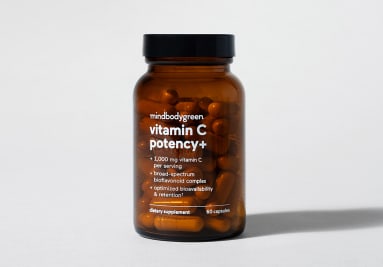You Should Be Taking A Vitamin C Supplement Daily: True Or False?



If you're the type of person that starts to load up on vitamin C supplements only when your child comes home from school looking admittedly crummy and indisposed or when several co-workers call out the same week, you may be wondering why in the world you would need to worry about taking vitamin C daily if you're feeling fine.
Although vitamin C is incredibly helpful (actually critically needed) in supporting both innate and adaptive immune system functions and responses, this essential nutrient helps with a truly wide array of daily physiological pathways and systems and shouldn't be pigeonholed as a partisan of the immune system.*
What is vitamin C?
As mentioned above, vitamin C is an essential nutrient—meaning the body cannot produce vitamin C on its own and it must be consumed through diet instead (every day).
While vitamin C's support in immune function and resilience is much appreciated, this potent antioxidant is involved in a number of other daily, complex biological pathways that support the heart, brain, skin, joints, eyes, and more.*
How vitamin C is used in the body daily
"Vitamin C is used as a cofactor in over a dozen different enzymes in the body to help build molecules we need to survive,"* explains Alexander Michels, Ph.D., clinical research coordinator at the Linus Pauling Institute. For survival: Chew on that for a minute.
As the body's primary water-soluble antioxidant, vitamin C has a very important role to play. "Vitamin C acts as a potent antioxidant and is able to scavenge a wide variety of reactive oxygen species,"* notes Anitra Carr, Ph.D., director of the Nutrition in Medicine Research Group at the University of Otago.
Its antioxidant activity takes place in both intracellular fluid (the cytoplasm within a cell) and extracellular fluid (the fluid outside of cells, such as blood plasma).*
Vitamin C works as a free radical scavenger, a powerhouse nutrient that increases blood antioxidant levels to help balance the body's oxidative stress levels1—all of which protect cells and promote cellular resilience throughout the body.*
Beyond its role in antioxidant capacity and redox balance, vitamin C also directly aids in or is required for the following physiological processes:*
- Iron absorption
- Amino acid and carbohydrate metabolism (i.e., to create energy from the foods we eat)
- Fat and protein synthesis
- Neurotransmitter synthesis
- Red blood cell production and oxygen transport
- Collagen synthesis and preservation
- Tissue growth, development, and repair
Our bodies require these diverse and paramount biological functions daily, and sufficient vitamin C levels available in the body are vital to their success.*
Do I need daily vitamin C supplementation?
Vitamin C is available in a number of fruits and vegetables—such as citrus fruits, cruciferous veggies, kiwis, strawberries, potatoes, and more.
When practicing mindfulness with your diet, it can be quite easy to reach a vitamin C intake of 90 milligrams (for men) and 75 milligrams of vitamin C (for women) each day, as recommended by the National Academies2. (Note: Vitamin C needs increase during pregnancy and lactation to 85 and 120 milligrams, respectively.)
However, 46% of U.S. adults3 are failing to reach the optimal intake from food alone—which means there's about a 50/50 chance you're not getting enough vitamin C from your daily meals. (Not the best of odds, if we're being honest.)
Luckily, not only can a high-quality vitamin C supplement help bridge those nutrient gaps, but it can support the multidimensional applications of C that your body needs to survive and, better yet, thrive.*
What should I look for in a vitamin C supplement?
As far as dosage goes, a high-potency serving of 1,000 milligrams is not only backed by research4 but is a meaningful quantity of vitamin C to provide all the C your body needs to carry out daily activities.* It's also important to find a high-quality vitamin C supplement with optimal form and function.
There are many different types of vitamin C used in supplements—including ascorbic acid, vitamin C/lipid/citrus bioflavonoid complex (such as PureWay-C™), food-derived vitamin C (e.g., acerola fruit), calcium ascorbate, liposomal, and calcium ascorbate-calcium threonate-dehydroascorbate (Ester-C).
When looking at lower-dose quantities (i.e., less than about 400 milligrams), these forms don't drastically differ from each other.
For example, ascorbic acid is a very common (and useful) form of vitamin C found in many foods and supplements. When that dosage is increased, however, a process called passive diffusion results in a large portion of ascorbic acid (and the other forms of vitamin C listed above) potentially going unused. Here's a more detailed science breakdown on this topic, in case you're curious.
In other words, when it comes to high-potency dosages, optimizing bioavailability to increase the absorption of vitamin C is crucial.
In high-potency doses, PureWay-C™ has evidence and clinical advantage rooted in science at the 1,000-milligram dose. This scientifically advanced complex features lipid and citrus bioflavonoid built-in absorption technology, to help chauffeur vitamin C into cells more efficiently and protect it from oxidation, resulting in a 233% higher cellular uptake and retention5 of vitamin C than ascorbic acid and a 122% increase compared to Ester-C.*†
When contrasting these four forms of vitamin C, PureWay-C™ is absorbed faster5, results in greater serum vitamin C levels6 (i.e., blood levels to achieve vitamin C sufficiency), and even achieves the most impactful anti-inflammatory and antioxidant benefits as measured by key biomarkers in the body.*†
If you're looking for a high-quality vitamin C supplement that serves up a high dose of vitamin C with built-in bioflavonoids and lipids to optimize absorption and bioefficacy in the body, mindbodygreen's vitamin C potency+ is the supplement for you.*
The takeaway.
You shouldn't wait until your immune system is kicking into high gear to introduce vitamin C.
A vitamin C supplement can help support your body's antioxidant strength, plus immune, cognitive, and skin health, each and every day—and thanks to its innovative ingredients, vitamin C potency+ has the superior bioavailability, retention, and action to make sure your body gets the C boost it craves.*
If you are pregnant, breastfeeding, or taking medications, consult with your doctor before starting a supplement routine. It is always optimal to consult with a health care provider when considering what supplements are right for you.

Morgan Chamberlain is a supplement editor at mindbodygreen. She graduated from Syracuse University with a Bachelor of Science degree in magazine journalism and a minor in nutrition. Chamberlain believes in taking small steps to improve your well-being—whether that means eating more plant-based foods, checking in with a therapist weekly, or spending quality time with your closest friends. When she isn’t typing away furiously at her keyboard, you can find her cooking in the kitchen, hanging outside, or doing a vinyasa flow.
6 Sources
- https://www.ncbi.nlm.nih.gov/labs/pmc/articles/PMC297842/
- https://www.ncbi.nlm.nih.gov/books/NBK225480/
- https://www.ncbi.nlm.nih.gov/labs/pmc/articles/PMC7352522/
- https://www.ncbi.nlm.nih.gov/labs/pmc/articles/PMC7589163/
- https://pubmed.ncbi.nlm.nih.gov/17901843/
- https://pubmed.ncbi.nlm.nih.gov/18971870/

